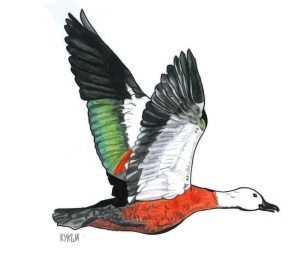Posted by Ellery McNaughton @EJ_McNaughton
There’s a lot of discriminating going on in Hollywood. You’ve probably heard of whitewashing, but what about hawk-washing? Chances are you’ve seen it in action. When some craggy mountaintop or rugged landscape appears on the screen, an eagle will fly by and give a majestic screech. Only problem is, that majestic call isn’t actually an eagle at all. It’s a red-tailed hawk. Apparently the patriotic symbol of America just doesn’t sound cool enough for the silver screen. Birds that sound cool can also nab roles from those more geographically qualified. A prime example of this is the laughing kookaburra, found only in Australasia, yet magically heard in movie jungles all over the world.

The A-listers: Red-tailed hawk, common loon and laughing kookaburra
Inaccurate or not, these birds and others do a lot of scene setting without us even realising. An owl hooting at night is somehow instantly spooky, despite it being what owls naturally do. Nothing says wilderness like a common loon, which is apparently all the reasoning Marvel needs to stick one on an alien planet. It does make me pity American bird enthusiasts, whose suspension of disbelief in movies doesn’t have the same shiny protective coating of ignorance that mine does. I accepted the sound of a common loon as an icon of haunted wilderness way before I knew the actual bird existed. The only twinge of recognition I get is hearing bellbirds in elven woods when watching Lord of the Rings for the hundredth time.
The ability of bird calls to invoke a particular idea or emotion is something I’ve been thinking about whilst going through the dawn/dusk chorus audio data I collected for my thesis. Rugged up with a winter dressing gown and hot water bottle, I didn’t expect to feel like summer was just around the corner. And yet, thanks to Turdus merula, I did.

Blackbird calls on a spectrogram – reminds me of impending summer. Also of Van Gogh.
Merely the recording of a blackbird singing at dusk was enough to get me dreaming of daylight savings and warm summer nights. It’s an interesting reminder of just how much meaning we unconsciously attach to bird calls, whether they be in movie soundtracks or the urban soundscapes we live in.
Ellery McNaughton is a PhD student in the Centre of Biodiversity and Biosecurity, School of Biological Sciences, University of Auckland. Her project investigates the effects of a city-wide changeover in streetlight technology on urban bird behaviour and ecosystem function. She is supervised by Margaret Stanley, Jacqueline Beggs, Kevin Gaston (University of Exeter, UK) and Darryl Jones (Griffith University, Australia).





 Daria
Daria Such adaptations are highly likely due to the multiple new selective pressures they may encounter. For example, new selection pressures may occur as they encounter new competitors, new climates and new habitats. These adaptations and trait shift changes can occur in relatively short time periods, within a few generations. The absence of competitors and natural enemies can lead to relaxed selection, and thus a change may occur through a non-adaptive shift. A non-adaptive shift may not translate to a genetic shift initially; however, such shifts can lead to reproductive isolation and subsequently speciation.
Such adaptations are highly likely due to the multiple new selective pressures they may encounter. For example, new selection pressures may occur as they encounter new competitors, new climates and new habitats. These adaptations and trait shift changes can occur in relatively short time periods, within a few generations. The absence of competitors and natural enemies can lead to relaxed selection, and thus a change may occur through a non-adaptive shift. A non-adaptive shift may not translate to a genetic shift initially; however, such shifts can lead to reproductive isolation and subsequently speciation.
 security, School of Biological Sciences at the University of Auckland. She is studying rapid evolution in exotic species, and is supervised by Darren Ward, Thomas Buckley and Quentin Paynter. Email: mkir508@aucklanduni.ac.nz
security, School of Biological Sciences at the University of Auckland. She is studying rapid evolution in exotic species, and is supervised by Darren Ward, Thomas Buckley and Quentin Paynter. Email: mkir508@aucklanduni.ac.nz